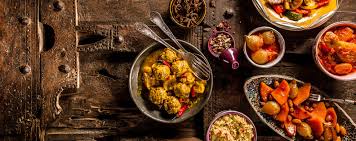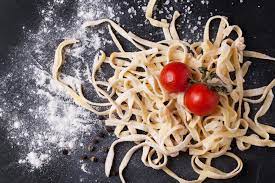The Flavours of Morocco: Exploring Authentic Moroccan Cuisine
When it comes to culinary delights, Morocco stands out as a vibrant tapestry of flavours and aromas. From the bustling markets of Marrakech to the coastal towns of Essaouira, Moroccan cuisine is a reflection of the country’s diverse history and cultural influences.
The Ingredients
At the heart of authentic Moroccan food are a few key ingredients that define its unique taste. From fragrant spices like cumin, cinnamon, and saffron to staple foods such as couscous, dates, and olives, each dish tells a story of tradition and heritage.
The Dishes
Moroccan cuisine is known for its rich tagines, slow-cooked stews that combine meat with vegetables or fruits in a harmonious blend of flavours. Whether it’s a lamb tagine with prunes or a vegetable tagine with preserved lemons, these dishes are a true reflection of Moroccan hospitality.
Another iconic dish is couscous, tiny steamed balls of semolina served with a variety of toppings such as vegetables, chickpeas, and tender meat. This staple dish is often shared among family and friends during special occasions.
The Flavours
What sets Moroccan food apart is its bold and complex flavours that tantalise the taste buds. The combination of sweet and savoury elements in dishes like pastilla (a savoury pie with layers of flaky pastry filled with spiced meat and almonds) or harira (a hearty soup made with tomatoes, lentils, chickpeas, and aromatic herbs) creates a culinary experience like no other.
The Experience
To truly appreciate authentic Moroccan food, one must embrace the communal aspect of dining in Morocco. Sharing a meal around a low table while dipping into a steaming tagine or sipping on mint tea is not just about nourishment—it’s about connecting with others and immersing oneself in the rich tapestry of Moroccan culture.
In Conclusion
Authentic Moroccan food is more than just sustenance—it’s an expression of history, tradition, and hospitality. From the bustling street food stalls to the elegant riads serving up traditional dishes with a modern twist, exploring Moroccan cuisine is an adventure for all the senses.
8 Essential Tips for Savouring Authentic Moroccan Cuisine
- 1. Try traditional dishes like tagine, couscous, and pastilla for an authentic Moroccan experience.
- 2. Use a variety of spices such as cumin, cinnamon, and turmeric to add depth of flavour to your dishes.
- 3. Don’t forget the preserved lemons and olives – they are key ingredients in many Moroccan recipes.
- 4. Experiment with sweet and savoury combinations by incorporating dried fruits like dates and apricots into your cooking.
- 5. Enjoy mint tea with your meal – it is a popular drink in Morocco known for its refreshing taste.
- 6. Visit local markets to source fresh ingredients like vegetables, herbs, and meats for an authentic touch.
- 7. Consider using a traditional clay tagine pot for slow-cooking dishes to enhance the flavours.
- 8. Finish off your meal with some Moroccan sweets like baklava or chebakia for a delightful end to your culinary journey.
1. Try traditional dishes like tagine, couscous, and pastilla for an authentic Moroccan experience.
For an authentic taste of Morocco, delve into traditional dishes such as tagine, couscous, and pastilla. These iconic Moroccan delicacies encapsulate the essence of the country’s culinary heritage, offering a sensory journey through a blend of aromatic spices, tender meats, and vibrant ingredients. Whether savouring the slow-cooked perfection of a tagine, savouring the fluffy texture of couscous topped with fragrant vegetables, or indulging in the delicate layers of pastilla filled with spiced meat and almonds, each bite promises to transport you to the heart of Morocco’s gastronomic traditions.
2. Use a variety of spices such as cumin, cinnamon, and turmeric to add depth of flavour to your dishes.
To enhance the authenticity of your Moroccan culinary creations, incorporate a diverse range of spices like cumin, cinnamon, and turmeric. These aromatic additions not only infuse your dishes with a depth of flavour but also capture the essence of traditional Moroccan cuisine. By embracing this tip, you can elevate your cooking to new heights and embark on a sensory journey through the vibrant tastes of Morocco.
3. Don’t forget the preserved lemons and olives – they are key ingredients in many Moroccan recipes.
In the realm of authentic Moroccan cuisine, a crucial tip to heed is the inclusion of preserved lemons and olives in your culinary creations. These humble yet potent ingredients serve as flavour powerhouses in countless Moroccan recipes, adding a zesty tang and depth of character that elevate dishes to new heights. Whether infused into tagines, scattered over couscous, or incorporated into salads, preserved lemons and olives are indispensable elements that capture the essence of Morocco’s rich gastronomic heritage.
4. Experiment with sweet and savoury combinations by incorporating dried fruits like dates and apricots into your cooking.
To elevate the authenticity of your Moroccan culinary creations, consider experimenting with a delightful blend of sweet and savoury flavours. An excellent tip is to introduce dried fruits such as dates and apricots into your cooking. These luscious additions not only infuse a natural sweetness but also add a unique texture and depth to your dishes. Whether simmered in a tagine with succulent meat or sprinkled over couscous for a burst of flavour, incorporating dried fruits brings a touch of Moroccan tradition and richness to your gastronomic adventures.
5. Enjoy mint tea with your meal – it is a popular drink in Morocco known for its refreshing taste.
In Morocco, a key tip for experiencing authentic Moroccan cuisine is to indulge in mint tea alongside your meal. Renowned for its invigorating flavour, mint tea is a beloved beverage in Moroccan culture. Its refreshing taste serves as a delightful accompaniment to the rich and aromatic dishes, enhancing the overall dining experience with a touch of tradition and hospitality.
6. Visit local markets to source fresh ingredients like vegetables, herbs, and meats for an authentic touch.
To truly capture the essence of authentic Moroccan cuisine, it is essential to follow tip number 6: Visit local markets to source fresh ingredients like vegetables, herbs, and meats for an authentic touch. The vibrant markets of Morocco offer a sensory feast of colours, scents, and sounds, where you can handpick the freshest produce and spices to elevate your culinary creations. By immersing yourself in the bustling energy of these markets and engaging with local vendors, you not only ensure the quality of your ingredients but also gain a deeper appreciation for the rich culinary heritage of Morocco.
7. Consider using a traditional clay tagine pot for slow-cooking dishes to enhance the flavours.
When delving into the realm of authentic Moroccan cuisine, tip number 7 advises considering the use of a traditional clay tagine pot for slow-cooking dishes. This ancient cooking vessel not only adds an element of tradition to your culinary experience but also enhances the flavours of your dishes by allowing them to simmer and meld together slowly. The porous nature of the clay helps to retain moisture, resulting in tender meats, perfectly cooked vegetables, and a depth of flavour that truly captures the essence of Moroccan cooking.
8. Finish off your meal with some Moroccan sweets like baklava or chebakia for a delightful end to your culinary journey.
To complete your authentic Moroccan dining experience, indulge in the sweet delights of Moroccan desserts such as baklava or chebakia. These delectable treats provide a perfect finale to your culinary journey, offering a symphony of flavours that blend honey, nuts, and delicate pastry into a delightful and satisfying conclusion to your meal.




